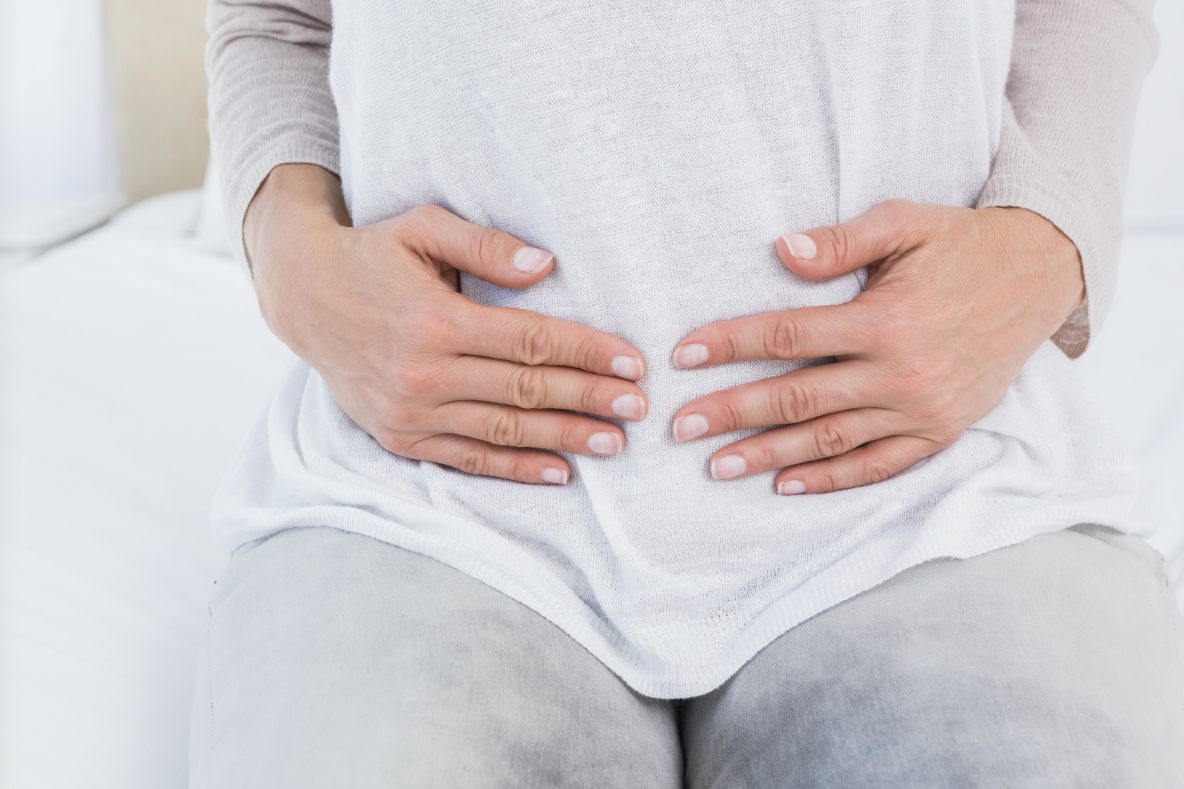Bloating is one of the most common symptoms we hear from our female clients, especially for women with PMS or going through perimenopause and beyond.
It's not fun to be offered a seat on the bus or train because you look like you could be pregnant! And no fun at all feeling uncomfortable in your clothes all day long.
Whatever your experience of bloating, it's an indication that your gut is not happy, so it's worth finding out what might be causing it so that you can address it and feel comfortable again.
You can watch the video below or listen to the podcast (episode 93).
What causes bloating?
There are many possible causes of bloating. Let's go through the most common ones;
1. Hormones – changing hormones can cause fluid retention and upset digestive balance. Bloating can be common in PCOS, endometriosis, PMS, and of course menopause.
2. Gut infection – underlying infections, such as bacterial imbalance, yeast (candida), parasites or viruses, can cause all sorts of digestive issues, including bloating
3. SIBO – Small Intestine Bacterial Overgrowth is a condition associated with excess microbes, usually bacteria or fungi, in the small intestine rather than colon. It comes with bloating, distention, gas and/or crampy pain. It's not often recognised or diagnosed in the medical world (often just put down to IBS), but we can test for it and treat it privately.
4. Food intolerance – if you're sensitive or intolerant to something like gluten, dairy, corn, soy, eggs or another food source, this can also cause bloating and other digestive symptoms.
5. Poor diet – too many refined carbs in your diet are favourite foods for bad bacteria and yeast.
6. Too many processed foods and chemicals – additives, preservatives and chemicals can disrupt digestive function and cause problems. Watch out for artificial sweeteners, which are not easy for the body to break down, and have been associated with digestive issues.
7. Lack of enzymes or stomach acid – if you don't produce enough stomach acid or digestive enzymes to break down your food, it can stay in your stomach longer than necessary and produce fermentable gases that can cause distention and bloating.
8. Stress – we all know that stress can mess with your bowel habits! When the body is in ‘fight or flight' mode, the last thing you need is to digest your lunch. So digestion function is suppressed, causing all kinds of issues.
9. Lack of sleep – have you ever travelled and your system has gone haywire? Your Circadian Rhythm regulates everything including your bowels and lack of sleep is a big disruptor.
10. Dehydration – lack of hydration and electrolyte imbalance can stop digestion and can cause constipation
11. Constipation – you’re just backed up!
12. Medications – certain medications have side effects that include bloating. These include Aspirin, Antacids, Diarrhoea tablets, iron supplements, HRT, Antibiotics, and Ibuprofen.
While many of these causes are diet or lifestyle related, there can be more serious conditions that you need to rule out with your Doctor if you've had prolonged and/or unexplained bloating. These include Celiac disease, Crohn's disease, Ulcerative Colitis, gastric ulcers, appendicitis, gallstones and certain cancers. Get checked if you're worried.
What can you do to relieve bloating?
If the cause of your bloating is diet and/or lifestyle related, here are some things you can try to relieve it;
- Chew more! Don't just bolt your food down. Digestion starts in your mouth (actually it starts when you anticipate food!), so take some time to enjoy your food slowly. Chew each mouthful, focus on your meal (rather than your phone or the TV!). Try Mindful Eating if you're new to this
- Stimulate your juices – take some digestive enzymes or a teaspoon of Apple Cider Vinegar before meals – this can really help stimulate your gastric juices and digest your food properly
- Relax more – make sure you’re switching off your stress response every day. Try meditation, deep breathing, yoga, walking in nature or anything that relaxes you
- Keep a food and symptom diary – try to spot any patterns
- Eliminate dairy and gluten – try it for a few weeks to see if they are causing your symptoms
- Clean up your diet – eat whole real foods, avoid processed foods and vegetable oils and make sure you're piling on the veggies
- Include gut friendly foods – such as ginger, dandelion, fennel, mint and parsley. And fermented foods like Kefir and Kombucha – full of natural probiotics that can help keep your microbial balance in check
- Stay hydrated! Make sure you fill up a jug of water for the day and keep drinking. You can flavour your water with lemon, cucumber, berries or other fruits or herbs
- Stay active – exercise helps to keep the bowels working
- Supplements can help; Magnesium Citrate relaxes bowel muscles (great if you're constipated), digestive enzymes, fish oils help to reduce inflammation, and Vitamin D regulates your immune system
- Get Tested – a stool test or breath test with a qualified health practitioner will test for underlying causes like infections or inflammation
If you'd like our help to identify the root cause of your bloating or other health issues, do contact us for more information about how we can help.

